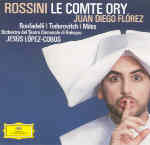In 1824 Rossini arrived in Paris in triumph; he was the leading opera composer of his day in all of the other major opera houses in Europe and was practically worshiped at home. He was in charge of the Theatre Italien and also was expected to write new works for the Paris Opéra. He planned to take his time, but Louis XVIII died in September and Rossini was asked to write an opera for the coronation of Charles X. The result was Il viaggio a Reims, an almost plotless bauble about a group of classy folk on their way to the coronation who get waylaid at a spa, and after four gala performances the work was withdrawn. By 1827, Rossini wrote to a friend that he wanted to retire soon, but before he did, he fulfilled his obligations by composing Le Comte Ory in 1828 and Guillaume Tell in 1829.
Since Il viaggio a Reims had been seen only by a selected group of people, Rossini did what he had been in the practice of doing for much of his career: he recycled and reworked a great deal of the music and placed it in Le Comte Ory, four numbers in Act 1 and two in Act 2. He actually made extensive changes even within the arias. To take just one instance, he re-wrote the first section and added a clarinet and flute obbligato to the latter part of the aria for Le Gouverneur, which was lifted from a more serious character, Milord, in Viaggio.
Ory is one of Rossini’s most enchanting works, a wry comedy without babbling buffo types, elegant music in a very French style, tunes galore, and superb–and difficult–writing for voices. There have been three previous recordings of the opera–two from the late ’50s with cuts (one on EMI under Vittorio Gui; another on Chant du Monde), and one complete on Philips, led by John Eliot Gardiner and recorded in 1998. The Chant du Monde set is notable only for Michel Senechal’s undertaking of the title role. The EMI is lovingly conducted by Gui with wit and long lines, and Juan Oncina’s Ory, though not fluent at the top of his voice, is smooth as silk. As the Countess, Sari Barabas also is a bit strained in the stratosphere yet offers many moments of charm.
The Gardiner set has the magnificent Sumi Jo as the Countess, along with John Aler, a very good Ory with all the notes who nonetheless sounds a bit blanched, Gilles Cachmaille’s classy, fluid Gouverneur, and Diana Montague’s perky and right-on Isolier. Gardiner’s leadership, if the truth be known, is wrong-headed; the music and situations are funnier than he lets us know and he doesn’t seem to appreciate Rossini’s wind writing. In short, he lacks the Rossini style.
And so we come to this new, uncut version, taped live at the Rossini Festival in 2003. You might guess that the raison d’être of the production (or at least the recording) is tenor Juan Diego Florez in the title role. In a word, he is perfect, singing with golden tone, accurate rhythm, and high notes produced so comfortably that they might as well be in the middle of his voice. And he creates a character vividly, singing expressively and partnering well in the many duets, trios, and ensembles. Much less good is the Countess, sung by Stefania Bonfadelli. Judging from the pictures in the accompanying booklet, she’s pretty young (and beautiful); if so, her voice is prematurely worn out. Her portrayal is excellent and so is everything but her tone and technique; notes are rancid at the top of the voice (which she displays with very high interpolations) and her coloratura just about makes it at times. As the page Isolier, a Cherubino-type who’s smitten with the Countess, Marie-Ange Todorovitch is excellent, with boyish low-notes and great perkiness. The two low voices–Alastair Miles (Le Gouverneur) and Bruno Pratico (Raimbaud)–are good Rossinians, handling their ornamented music well and singing with great rhythmic accuracy.
Jesus Lopez-Cobos leads a performance that varies nicely between the opera’s more rambunctious moments and, say, the marvelous, soft Countess-Ory duet in Act 2. He holds the Bologna Orchestra and Prague Choir on a tight rein; the show only occasionally seems a bit overweight. The sound is terrific and audience applause only intrudes at the close of the acts. The booklet contains a good essay and French-German-English librettos. Despite Bonfadelli, who somewhat sours but does not spoil the show, this now is the Le Comte Ory recording of choice. Rossini would love Florez; so will you.
































